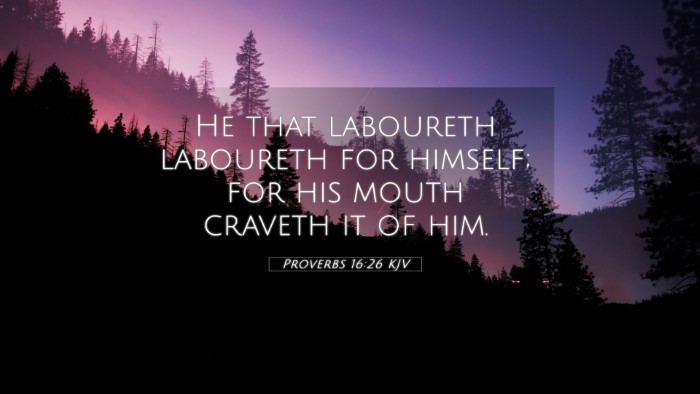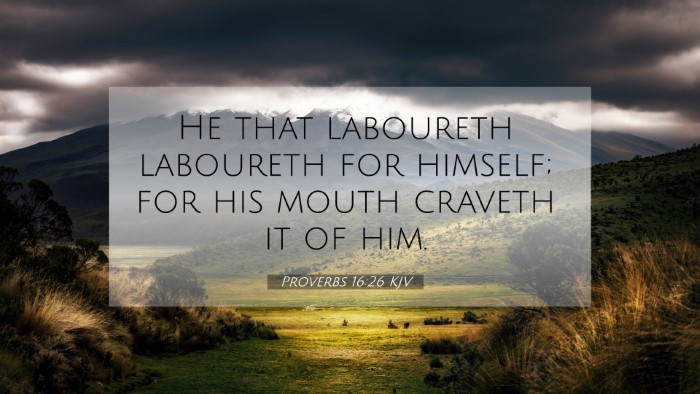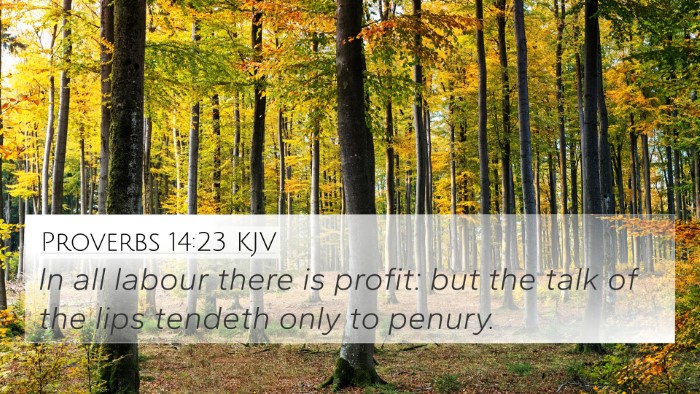Understanding Proverbs 16:26
Proverbs 16:26 states: "The laborer’s appetite works for him; his hunger drives him on." This verse captures the essence of diligence and the intrinsic motivation that accompanies physical needs.
Meaning of Proverbs 16:26
This proverb emphasizes how human motivation and effort are often driven by the basic needs of life, particularly hunger and sustenance. The insights from various public domain commentaries highlight this motivational aspect.
Insights from Commentaries
-
Matthew Henry:
Henry explains that a person’s labor is not only a means of survival but also tied to their inherent desire for provisions. The hunger, in this context, is portrayed as a driving force that not only compels action but also emphasizes the value of work.
-
Albert Barnes:
Barnes notes that the verse illustrates the wise nature of God in creating a system where individuals are motivated by their needs. He suggests that this divine order prompts people to work diligently, thereby contributing to their own well-being and the welfare of society.
-
Adam Clarke:
Clarke takes a more analytical approach by connecting the need for food with the broader implications of work ethics. He asserts that without the drive of hunger, many may lack the motivation to engage in labor, which is essential in realizing life’s necessities.
Bible Cross-References and Related Verses
To fully grasp the implications of Proverbs 16:26, it is useful to consider other biblical texts that create thematic links through cross-referencing.
- Proverbs 12:11: "He who tills his land will be satisfied with bread, but he who follows frivolity is devoid of understanding." This verse reiterates the value of hard work in achieving satisfaction.
- 2 Thessalonians 3:10: "For even when we were with you, we commanded you this: If anyone will not work, neither shall he eat." This New Testament verse supports the idea of work being tied to sustenance.
- Proverbs 10:4: "He who has a slack hand becomes poor, but the hand of the diligent makes rich." This captures the principle that diligence leads to prosperity, reinforcing the motivation behind labor.
- Ecclesiastes 3:13: "And also that every man should eat and drink and enjoy the good of all his labor—it is the gift of God." This verse underscores the enjoyment and purpose found in labor.
- 1 Timothy 5:8: "But if anyone does not provide for his own, and especially for those of his household, he has denied the faith and is worse than an unbeliever." This aligns the responsibilities of labor with familial duty.
- Proverbs 21:25: "The desire of the lazy man kills him, for his hands refuse to labor." Here, laziness is contrasted with the industrious nature highlighted in Proverbs 16:26.
- Colossians 3:23: "And whatever you do, do it heartily, as to the Lord and not to men." This perspective motivates individuals to work with purpose beyond mere survival needs.
Connecting Themes in Scripture
The potential themes of labor, motivation, and reward interlink with numerous passages in both the Old and New Testaments. By studying these connections, one can see a cohesive biblical narrative that honors the principles of hard work and divine provision.
Exploring Bible Verse Connections
When analyzing biblical texts like Proverbs 16:26, it's crucial to utilize tools and techniques for effective Bible cross-referencing. This process enhances understanding and reveals how various passages inform and support one another.
Benefits of Cross-Referencing
Cross-referencing enriches individual study and sermon preparation by:
- Expanding understanding of thematic connections.
- Facilitating a more comprehensive view of biblical teachings.
- Enhancing the ability to draw parallels from different parts of Scripture.
- Providing clarity through comparative analysis of verses.
Conclusion
Proverbs 16:26 serves as a powerful reminder of the relationship between necessity, labor, and motivation. By examining this verse alongside related Scripture, believers gain a deeper insight into the purpose behind their actions and the importance of work ethic within the community.
Incorporating various cross-referencing techniques not only aids in understanding this particular verse but also enriches the overall study of the Bible, opening doors for spiritual growth and insight.







